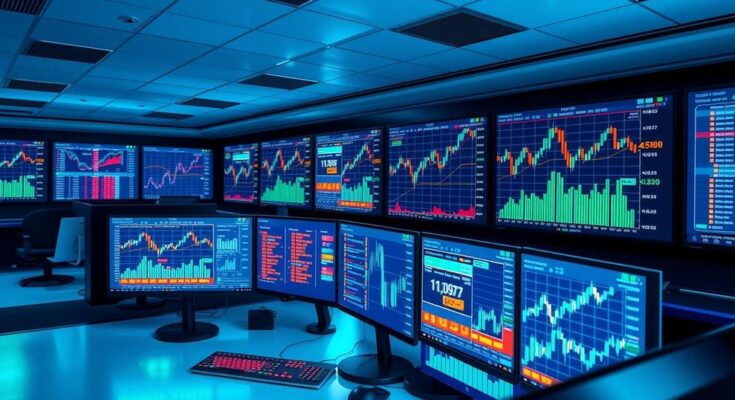European futures are mixed after positive retail sales figures from China, while geopolitical factors remain relevant, particularly with upcoming central bank meetings and U.S.-Russia discussions. Significant corporate developments include AstraZeneca’s acquisition of EsoBiotec, and concerns regarding U.S. tariffs, especially for companies like Novartis and BMW.
European futures showed a mixed performance on Monday, influenced by promising economic indicators from China, while remaining attentive to geopolitical developments. EuroSTOXX50 futures decreased by 0.2%, whereas FTSE and DAX futures remained stable, reflecting cautious optimism in the markets.
China’s retail sales growth accelerated in the early months of the year, signifying a positive trend for domestic consumption. This increase follows the State Council’s announcement of a “special action plan” to enhance domestic demand, aimed at stimulating economic activity in the nation.
U.S. President Donald Trump is scheduled to speak with Russian President Vladimir Putin on Tuesday to discuss the potential resolution of the conflict in Ukraine, following productive discussions between U.S. and Russian officials in Moscow.
Central bank decisions from the Bank of Japan and the Federal Reserve are anticipated on Wednesday, with the Bank of England following on Thursday, marking a critical week for monetary policy.
In corporate news, AstraZeneca announced its acquisition of biotechnology firm EsoBiotec for a valuation of up to $1 billion. Additionally, Porsche SE, Volkswagen’s largest shareholder, dismissed a report suggesting the sale of voting shares in the automaker, emphasizing its commitment to retaining control. U.S. tariffs remain a primary concern for investors, especially with Novartis CEO Vas Narasimhan indicating close scrutiny of upcoming reciprocal tariff policies introduced by the United States.
German automaker BMW forecasted a significant financial impact from tariffs, estimating costs of 1 billion euros (approximately $1.09 billion) for the year ahead, underscoring the ongoing trade tensions affecting the industry.
In conclusion, European futures reflect a cautious yet optimistic sentiment, influenced by encouraging data from China amidst ongoing geopolitical tensions. Key developments such as potential dialogues between the U.S. and Russia, forthcoming central bank meetings, and significant corporate news highlight the complex economic landscape. Moreover, the ramifications of U.S. tariffs remain a critical consideration for major corporations in Europe, further shaping market dynamics.
Original Source: www.tradingview.com




